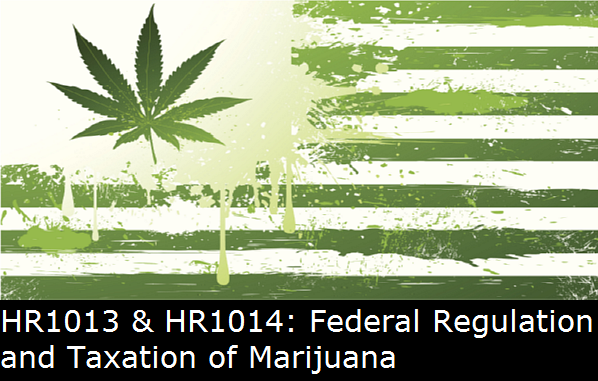
Two bills that could legalize cannabis at the federal have been introduced into congress by U.S. Representatives Jared Polis (D-CO) and Earl Blumenauer (D-OR). These bills would establish regulation of cannabis similar to alcohol, and would also put on federal excise tax on recreational cannabis while leaving states to choose their own side.
HR1013 the Regulate Marijuana Like Alcohol Act would remove cannabis from the scheduling of the controlled substances act while transitioning oversight of marihuana from the Drug Enforcement Agency (DEA) to the Bureau of alcohol, tobacco, firearms, and explosives. This would also provide a safety nets for individual states, freeing them from intervention by federal agencies.
HR1014 the Marijuana Tax Revenue Act of 2015 would establish a federal excise tax on the non-medical sales of cannabis as well as an occupational tax for marijuana businesses. HR1014 will also provide civil and criminal penalties for those who fail to comply with federal regulations. The federal excise tax would begin at 10%, rising as the black market is phased out to a cap of 25%.
HR1013 & HR1014 have been assigned to a congressional committee on February 20, 2015, which will consider it before possibly sending it on to the House or Senate as a whole.
Currently 23 states have medical marihuana laws in place, while 4 states including the District of Columbia have legalized recreational cannabis; 11 more states have passed legislation for low THC strains to be used for some medical conditions. The laws are always changing and there currently other legislation being debated such as Maryland who decriminalized last year, and is now looking to pass regulation and taxation.
HR1013 the Regulate Marijuana Like Alcohol Act would remove cannabis from the scheduling of the controlled substances act while transitioning oversight of marihuana from the Drug Enforcement Agency (DEA) to the Bureau of alcohol, tobacco, firearms, and explosives. This would also provide a safety nets for individual states, freeing them from intervention by federal agencies.
HR1014 the Marijuana Tax Revenue Act of 2015 would establish a federal excise tax on the non-medical sales of cannabis as well as an occupational tax for marijuana businesses. HR1014 will also provide civil and criminal penalties for those who fail to comply with federal regulations. The federal excise tax would begin at 10%, rising as the black market is phased out to a cap of 25%.
HR1013 & HR1014 have been assigned to a congressional committee on February 20, 2015, which will consider it before possibly sending it on to the House or Senate as a whole.
Currently 23 states have medical marihuana laws in place, while 4 states including the District of Columbia have legalized recreational cannabis; 11 more states have passed legislation for low THC strains to be used for some medical conditions. The laws are always changing and there currently other legislation being debated such as Maryland who decriminalized last year, and is now looking to pass regulation and taxation.

